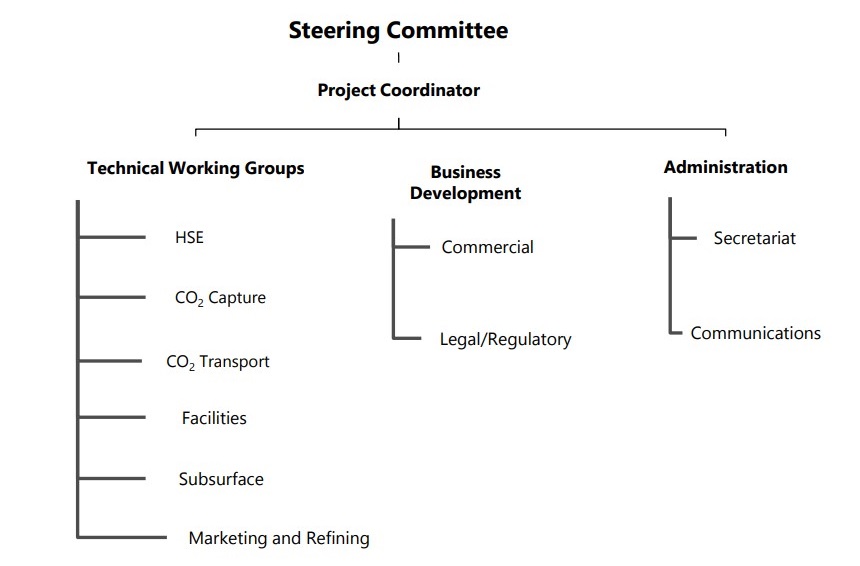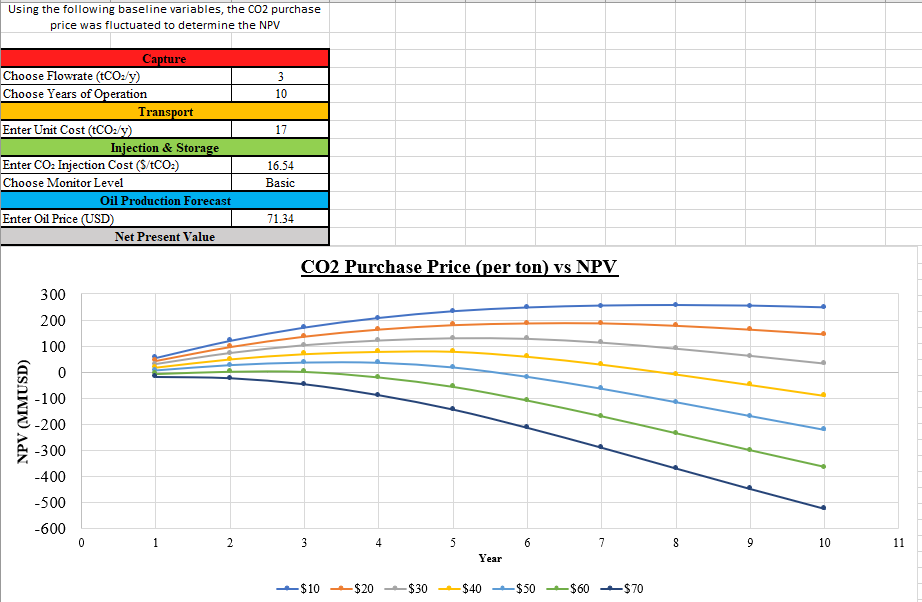Carbon Dioxide Enhanced Oil Recovery Road Map (CERM)
In 2017 a Carbon Dioxide Enhanced Oil Recovery Road Map (CERM) (http://www.thecermproject.com/) Project was launched with a Steering Committee comprising equal membership from the MEEI, Petrotrin, the National Gas Company (NGC), UWI and UTT. The UWI and UTT members co-chaired the Committee. It should be noted that the overarching goal of the CERM Project at inception was the implementation of CO2 EOR on a large scale to increase Trinidad and Tobago’s oil revenue by TT$ 200-500 million per year in the medium term. The final phase aimed to increase oil production by 15,000 bopd, six years after project launch, using dedicated CO2 pipeline, injection and production facilities over multiple oil fields. The CERM was renamed to the CO2 Emission Reduction Mobilization in 2019.
The CERM project’s operational structure is shown below:

Figure 2: CERM Operational Structure
It incorporates key stakeholders into Working Groups whose objective is to provide data-based recommendations for CO2 EOR pilot projects while building local technical expertise.
CCS symposium
The symposium, hosted at UTT Point Lisas, was held on the 29th & 30th October 2019 in collaboration with foreign partners IEA Greenhouse Gas R&D Programme (IEAGHG) and The University of Texas at Austin’s Bureau of Economic Geology (UT-BEG) as well as the UTT and UWI. The goals of the symposium were to outline the foundation that is already in place for CCS in T&T and to discuss a way forward for further development with technical support from international partners. It also explored UNFCCC and other funding sources for national CCS programme development. (www.thecermproject.com/uploads/1/1/9/7/119795923/cerm_symposium_summary_report.pdf )
Figure 3: CCS Symposium Banner
Efforts by the Government to transition towards CCUS feasibility.
- In September and October, 2012, UWI along with the Global CCS Institute hosted a workshop to draft a CCS Legal and Regulatory Permitting Matrix. Key stakeholders from that session were the MEEI, Environmental Management Authority (EMA), Occupational Safety and Health Agency (OSHA) and the Town and Country Planning Agency. This initiative formed part of an Inter-American Development Bank (IDB) sponsored grant Program titled “Mainstreaming of Climate Change into National Development and Capacity Building for Participation in Carbon Markets”. Subsequent to the workshop the Global CCS Institute released the October 2012 document, “Carbon Capture and Storage Regulatory Review for Trinidad and Tobago” intended to help the Government and other stakeholders understand the potential role CCS could play in Trinidad and Tobago.(https://www.globalccsinstitute.com/archive/hub/publications/54126/ccs-regulatory-review-trinidad-tobago.pdf )
- CCS TLM, a consultancy to carbon capture and storage market, reported on the “Feasibility of Carbon Capture and Storage Projects in Trinidad and Tobago” in a 2013 report to the Ministry of Environment and Water Resources.
- A Techno-economic Analysis of Carbon Management in Trinidad and Tobago through coupled Enhanced Oil Recovery and Geological Storage (The 2018 Carbon Management study) already mentioned, was funded by the Government of Trinidad and Tobago at the cost of US $470,835 or TT $3,036,886. A proprietary reservoir screening tool for selecting suitable targets for CCUS was developed based on the reservoir properties of Trinidad’s oil fields. An excel based economic model for predicting CCUS project performance based on key inputs was a key output of the research (See Figure 4 below). These tools are available for licensing from UTT.

Figure 4: Carbon Management Chart
- In 2020, the MEEI publicly released the guidance document “Guidelines to Operators for the Approval of a CO2 Injection Project by the Resource Management Division” ( https://www.energy.gov.tt/wp-content/uploads/2020/09/MEEI-CO2-Flood-Guidelines-.pdf
- The Ministry of Planning and Development in close coordination with the United Nations Framework Convention on Climate Change (UNFCCC) and various consultancies is actively developing a Carbon Pricing Policy for Trinidad and Tobago. Recent public consultations have been held in this regard.
- The previously mentioned National Storage Atlas project, which is planned over a one (1) year period starting from December 2021 was approved by the MEEI for funding at an estimated cost of US$146, 941.00 or TT 1,998,400.00. In January 2022, BP committed an additional US$50,000.00 or TT$340,000.00 to the National Storage Atlas project [See BP’s media release].The main objective of the project is to construct a CO2 storage atlas and the sub objectives are to:
- Gather data on relevant onshore and offshore basins in T&T for geological screening into plausible and implausible storage sites;
- Survey the literature on the properties necessary for reservoir storage calculations and describe the laboratory testing methods and subsurface surveys essential for appraising storage formations and caprock;
- Locate selected drill core boreholes to conduct geotechnical tests aimed at validating the literature values used for aquifer storage-capacity calculations;
- Estimate the CO2 storage capacities of prospective formations.
- Conduct an analysis of technical, logistical, legislative and regulatory gaps in the CCS chain to develop an appropriate training programme with international partners.
- Cabinet appointed on 18 February, 2021, a Carbon Capture and Carbon dioxide Enhanced Oil Recovery Steering Committee to manage the implementation of a Large-Scale CO2 EOR Project which seeks to increase Trinidad and Tobago’s oil revenue while simultaneously addressing the reduction of carbon dioxide emissions, carbon capture and carbon sequestration. The steering committee comprises:
- Chairperson-Mrs. Penelope Bradshaw-Niles, Permanent Secretary (Ag.) Ministry of Energy and Energy Industries (MEEI),
- Ms. Arlene Chow-Chief Executive Officer Heritage Petroleum Limited,
- Professor Andrew Jupiter-Head of Department of Petroleum Engineering, University of the West Indies
- Mr. Kishan Kumarsingh- Head Multilateral Agreements Unit, Ministry of Planning and Development and
- Mr Himalaya Boodoosingh- Manager HSSE, National Gas Company.
- An engineer from Atlantic LNG to be incorporated at an appropriate stage of the project.
The project would focus on CO2 EOR in the oil acreages held by Heritage Petroleum company in Point Fortin Central, Guapo. Gran Ravine and Forest reserve where Heritage would have the lead and be responsible for the implementation of the project. MEEI would fund the technical studies which will be conducted by UWI and/or UTT by utilizing the Research and Development funds contributed under the Production Sharing Contracts. The first meeting of the committee was held on 18 March at the MEEI. (See media release: Carbon Capture and Carbon Dioxide (Co2) Enhanced Oil Recovery Steering Committee Established.) The committee has since met fifteen (15) times and consulted with twenty (20) stakeholders in the upstream, midstream and downstream energy sectors and inaugurated multiple workgroups to implement its objectives.
- In the 2022 National Budget passed in October 2021, the Minister of Finance introduced an allowance in ascertaining the chargeable profits of the company for that year of income of 30.0 percent of the actual expenditure up to a maximum of $500,000 (US$73,529.00) for companies that invest in Carbon Capture and Storage and Enhanced Oil Recovery. This measure was assented to in Parliament in December 2021 and took effect on January 1 2022 and the government is committed to reviewing this measure in future as needed.[See Finance Act No. 16 of 2021.
- In September 2023 the following changes to the Committee were agreed to by Cabinet:
- that the Carbon Capture and Carbon Dioxide (CO2) Enhanced Oil Recovery Steering Committee be extended for two years until September 30, 2025.
- that the original Terms of Reference for the Steering Committee be amended to include methane management and development of a methane management policy.
- to rescind the appointments of Ms. Arlene Chow, former CEO, Heritage and Professor Andrew Jupiter, Coordinator of Petroleum Studies Unit, University of the West Indies from the CCEOR Steering Committee.
- to appoint Mr. Erik Keskula, CEO, Heritage, Dr. Hasley Vincent, Coordinator of BSc Petroleum Geoscience, University of West Indies and Mr. Christian Welsh, Senior Petroleum Engineer (Ag.), Ministry of Energy and Energy Industries to the CCEOR Steering Committee.
- For an update on the status of the committee as of the end of May 2022 please download the linked presentation made at the MEEI booth at the Trinidad and Tobago Energy conference 2022.
Update on the Carbon Capture CO2 EOR Steering CommitteeDownload
- For an update on the status of the committee as of the end of January 2023 please download the linked presentation made at the MEEI booth at the Trinidad and Tobago Energy conference 2023.
Carbon Capture, Utilization and Storage, A Trinidad and Tobago Update
Presented by Mrs. Penelope Bradshaw-Niles, Permanent Secretary at the Ministry of Energy and Energy Industries at the Trinidad and Tobago Energy Conference January 23-25 2023.
- For an update on the status of the committee as of the end of January 2024 please download the linked presentation made at the MEEI booth at the Trinidad and Tobago Energy conference 2024.
For further information on Carbon Capture Utilization and Storage (CCUS) In Trinidad and Tobago or any information discussed in this article, please email cwelsh@energy.gov.tt.
